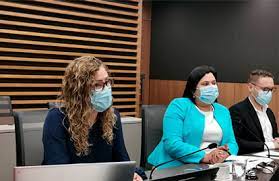The Environmental Commission of the Costa Rican Legislative Assembly is defining whether the production of medicinal cannabis is restricted only to national producers or the door is left open for foreign companies to enter this new industry for the country.
On Wednesday the legislative commission began the discussion of the 29 motions presented to the bill. The discussion focused on article 12 of the ruled draft which indicates that: “Licenses for cultivation and production in the national territory of psychoactive cannabis for medical or therapeutic purposes may only be granted to organizations of agricultural producers, established as cantonal agricultural centers, associations of small and medium producers, agricultural or self-management cooperatives or indigenous development associations”.
The liberationist deputies, Karine Niño and Roberto Thompson, presented a motion to modify this article with the following wording: “they will be granted to natural or legal persons in accordance with the regulatory norms established by the Ministry of Agriculture and Livestock, complying with the provisions of the present law”.

The Frente Amplio deputy, José María Villalta, acknowledged that the original article of the text can be very restrictive by including the word “only” and leaving out other industries, but added that the objective of the initiative is that the benefits that will be generated can reach this highly affected agricultural sector.
Giving added value
“The idea is that local producers can carry out the cultivation and can be linked with other industries that give added value and can sell or even export the product and that the benefits of this law reach that impoverished agricultural sector”, said Villalta. He proposed that a middle ground be reached to devise a mechanism, by means of a requirement or percentage, that can make these linkages.
Setting production quotas

The deputy of the Citizen Action Party (PAC), Paola Vega, also asked that a balance be reached in the text. Vega noted that going to the other end of the proposal could foster oligopolies of medicinal cannabis in the country, where companies with strong capital would accumulate the benefits of the industry. He suggested that agricultural producers, cooperatives or associations should have preferential treatment either by establishing production percentages.
Deputy Thompson recalled that this industry is worth billions of dollars, but that limiting it to the local would be to close the door to jobs, although he acknowledged that he agrees to seek a more consistent wording in order to give farmers a local boost. Deputy Niño recalled that the project is not a rescue initiative, but rather to open a new activity in the country and that it cannot be restricted to a specific group.
Merging cannabis crops with coffee
The Christian Socialist, Erwen Masís, also a member of the commission, recognized that it is important to build an opportunity for agricultural cooperatives, where in Alajuela there are some that have even shown interest in merging cannabis with coffee, although he recalled that private companies should also have access to that production, since they also pay taxes and create jobs.
The commission agreed to approve motion 10 proposed by the Liberation fraction, with the commitment to seek a better wording for the second day of motions. 20 of the 29 motions presented were known and a total of seven were approved.
